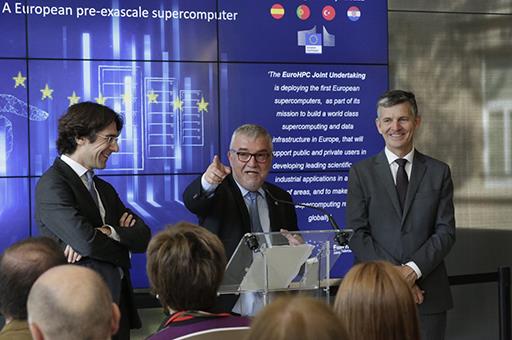MareNostrum 5 to include experimental platform for creating "Made in Europe" supercomputing technologies
News - 2019.6.10
In this way, besides offering first-class supercomputing services for researchers all over Europe, the BSC is committed to using its research to help future generations of supercomputers include technologies that are entirely developed in Europe.
The launch of this experimental platform, the only one that the EuroHPC Joint Undertaking (EuroHPC-JU) has decided to finance, was the main piece of news revealed at the official event attended by the State Secretary for R&D+i and Universities, Ángeles Heras, and the Director-General of Communications Networks, Content and Technology (DG Connect) of the European Commission, Roberto Viola.
Roberto Viola explained the roadmap drawn up by EuroHPC-JU for exascale. This is the framework in which the BSC was selected as one of the three centres to have pre-exascale computers co-financed by the European Commission in 2021. "I am very proud to announce that, today, we were able to keep our promise of working together with the countries that make up the EuroHPC Joint Undertaking and jointly implement high-level data and supercomputing infrastructures in the European Union", said Roberto Viola.
"These high-performance systems will provide Europe with the high-quality capabilities that it needs to keep up with its global competitors. They will help scientists undertake research projects of great relevance to our society in such varied fields as climate change, personalised medicine, brain function and cosmology, among others. At the same time, they will help accelerate innovation in important areas for the competitiveness of the Spanish economy, such as manufacturing, engineering or the design of new materials and new medicines", stressed the Director-General of the Commission.
In turn, the Spanish State Secretary for R&D+i and Universities said that "Europe could not allow itself to fall behind in this strategic field. With this new world-class supercomputing infrastructure, Spain and Europe are taking a vitally important step towards maintaining their leadership capacity". In this regard, she stressed that "MareNostrum 5 is a technological gem that we will harness to its full extent in its multiple scientific and industrial applications".
The Director of the BSC, Mateo Valero, who is the scientific coordinator for developing the first accelerator (GPU), explained that the initiative to include an experimental platform in MareNostrum 5 stems from the conviction that, "for security and sovereignty, Europe cannot remain so highly dependent on computing technologies from other continents".
He went on to add that, "at the BSC, we are firmly convinced that the development of our own technology should be a priority for European researchers in computing science and we welcome the fact that the European Commission has also committed to this need in recent years", in reference to the EC initiative to include the development of new technologies on the European supercomputing roadmap being implemented through the EuroHPC-JU initiative.
Mateo Valero recalled that "the major challenges of our society, such as studying climate change and developing new energies, like fusion, require exascale computers, which are much more powerful than those we have now, with characteristics that meet the new needs of researchers and a proportionally lower energy consumption than existing computers, meaning we need to keep researching".
MareNostrum 5
The new supercomputer will cost 223 million euros, which is the budget allocated to procurement, installation and operational maintenance over five years. 50% of this budget will be financed by the European Union and the other 50% by the countries making up the support consortium for the proposal.
To draft its bid, the BSC received political and financial support from the Spanish and Portuguese governments from the outset, which were subsequently joined by the Turkish and Croatian governments. Ireland, which gave its political support to the proposal, is looking to join the consortium. The BSC trustees (the Ministry of Science, Innovation and Universities of the Government of Spain, the Department for Enterprise and Knowledge of the Regional Government of Catalonia and the Technical University of Catalonia) also supported the proposal from day one.
About the Barcelona Supercomputing Centre
The Barcelona Supercomputing Centre (BSC) is the leading supercomputing centre in Spain. It specialises in high-performance computing (HPC). It has a dual purpose: to offer supercomputing infrastructures and services to Spanish and European scientists; and to generate knowledge and technology for transferral to society.
The BSC is a Severo Ochoa Centre of Excellence, a first-class member of PRACE (Partnership for Advanced Computing in Europe) and manages the Spanish Supercomputing Network (Spanish acronym: RES). The BSC is a public consortium made up by the Ministry of Science, Innovation and Universities of the Government of Spain (60%), the Department for Enterprise and Knowledge of the Regional Government of Catalonia (30%) and the Technical University of Catalonia (10%).
Non official translation





